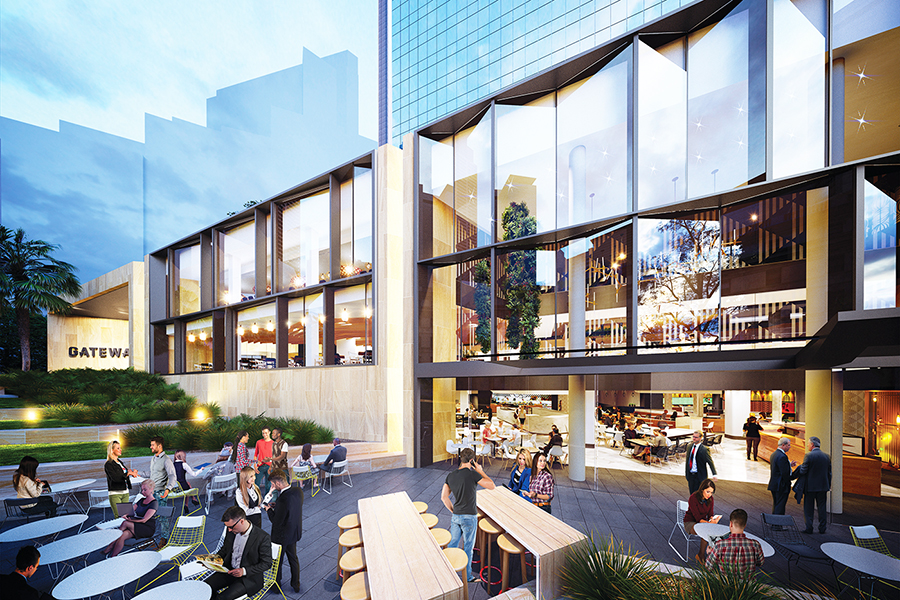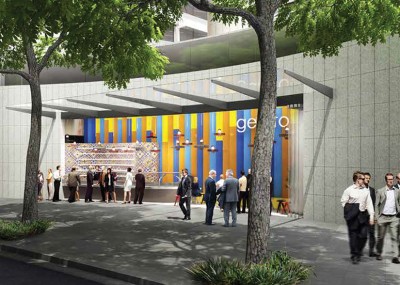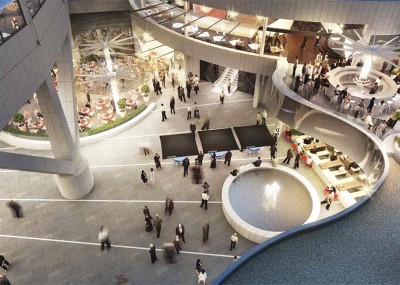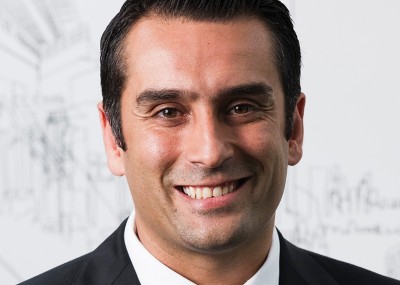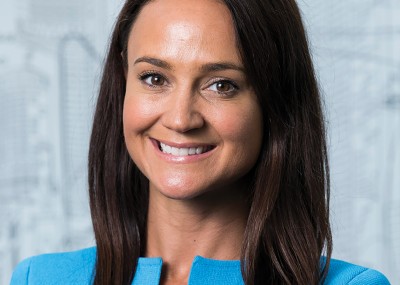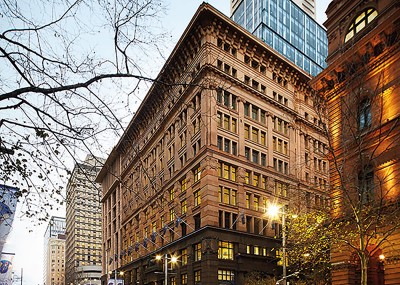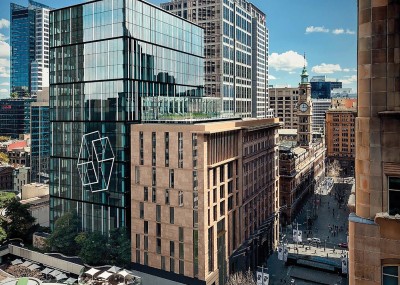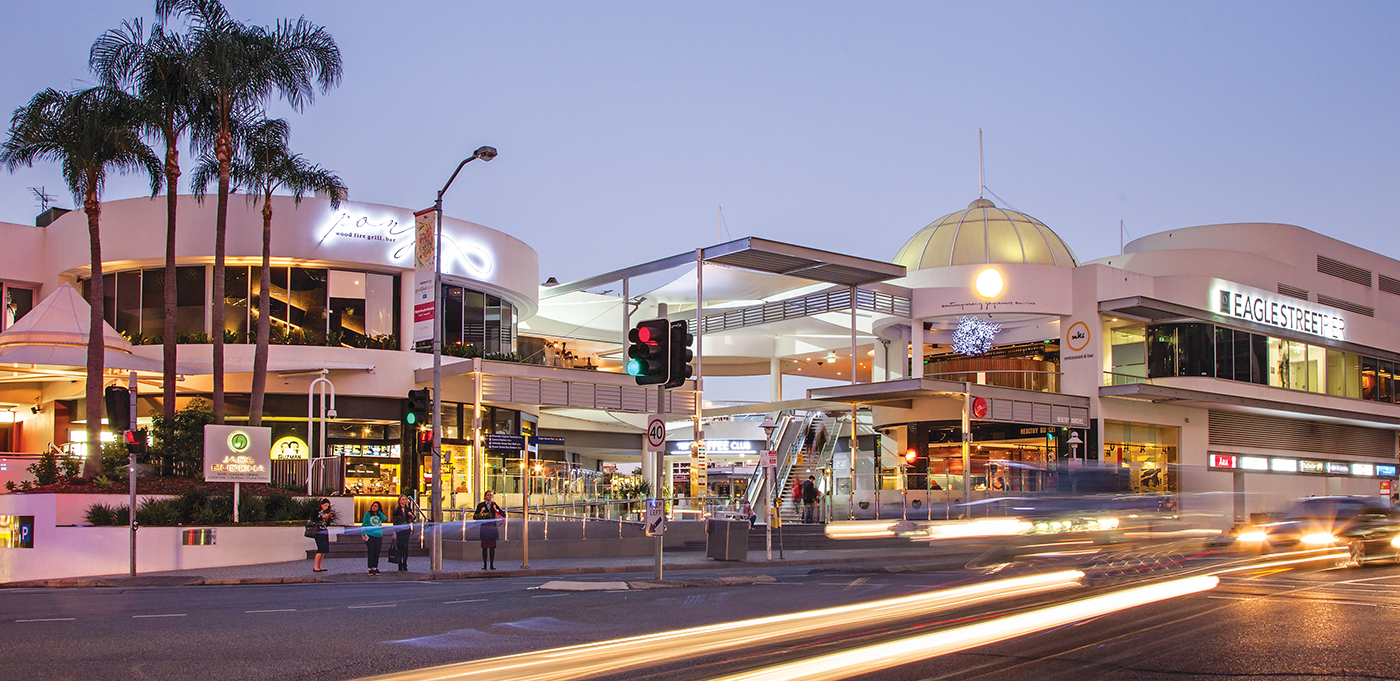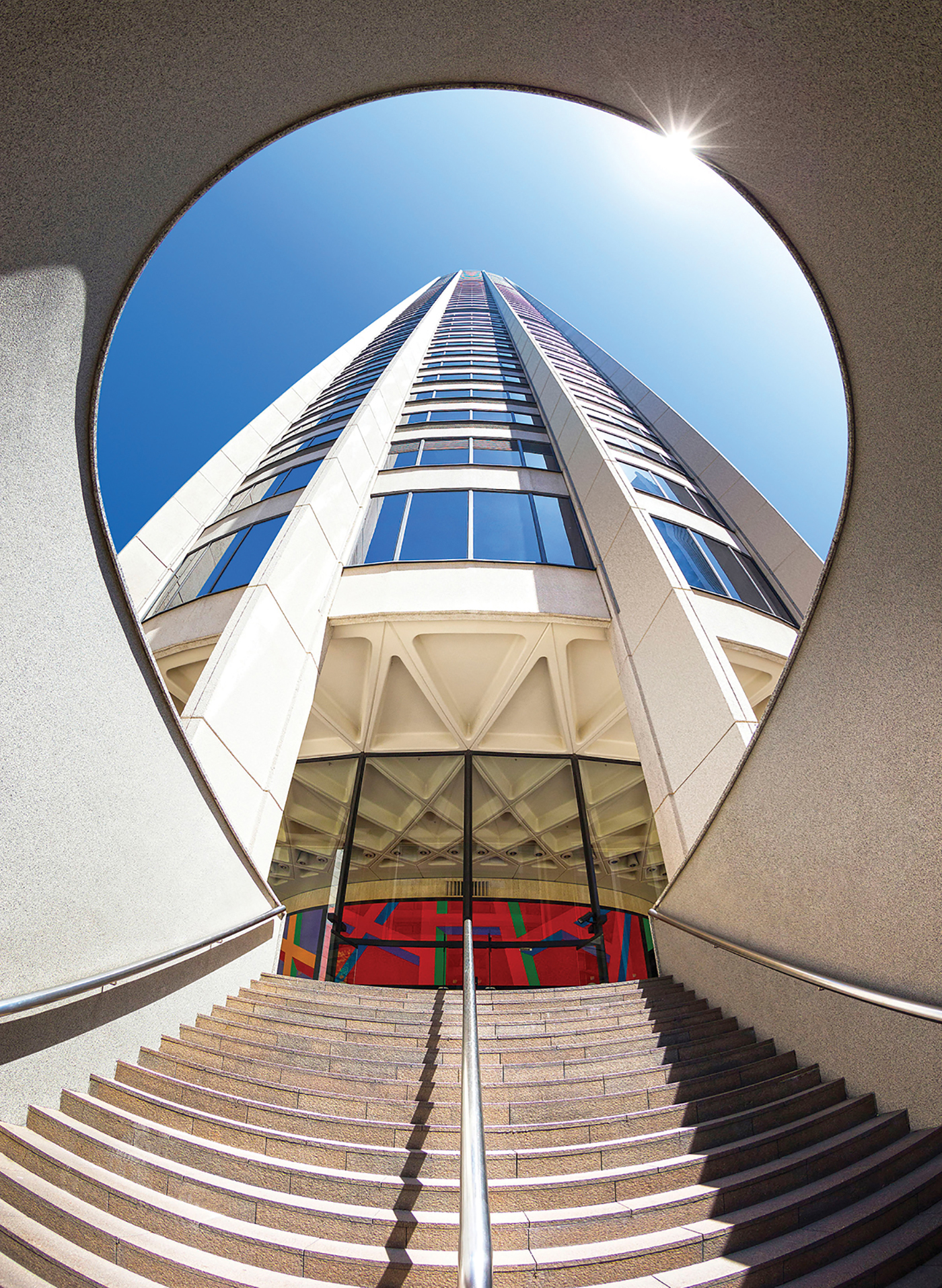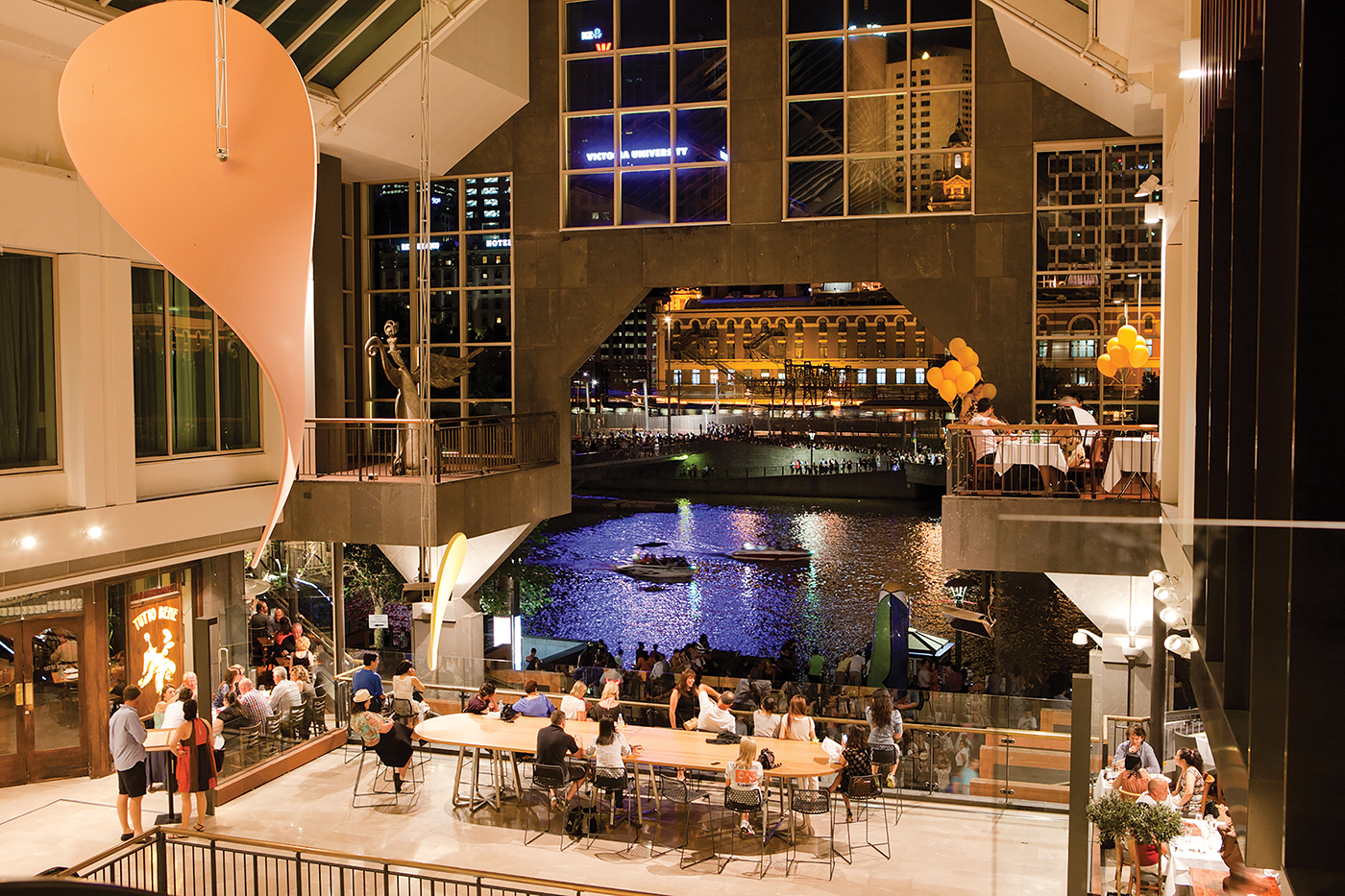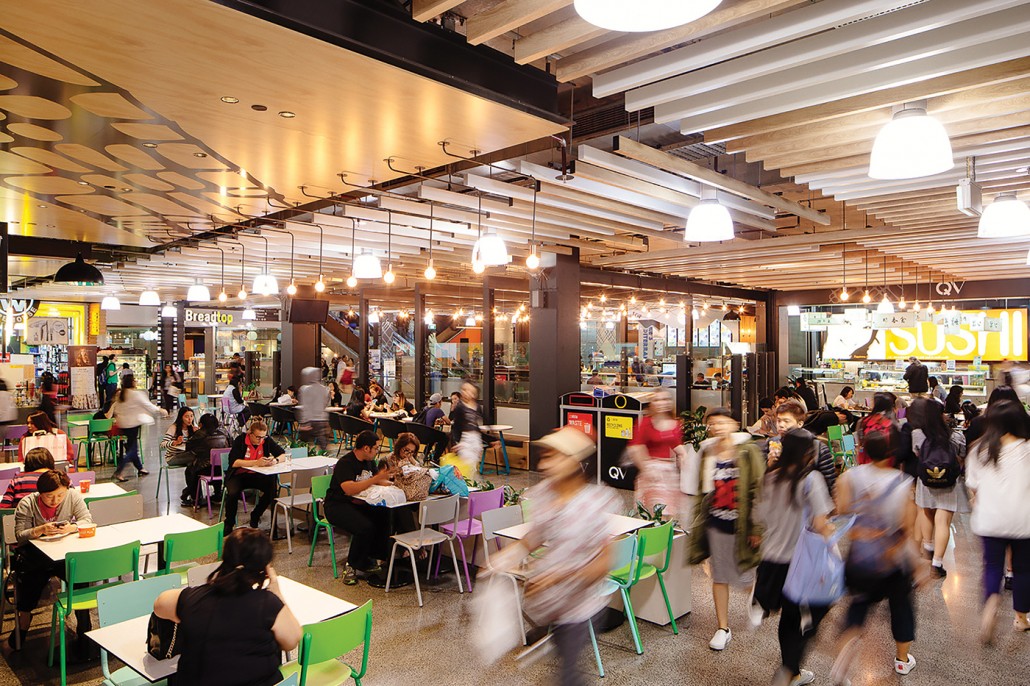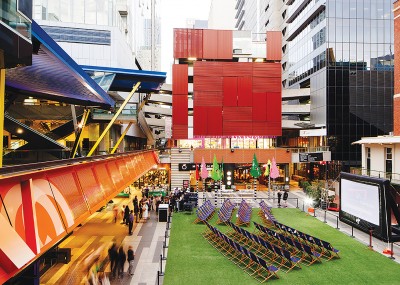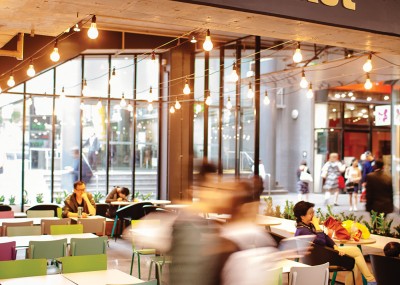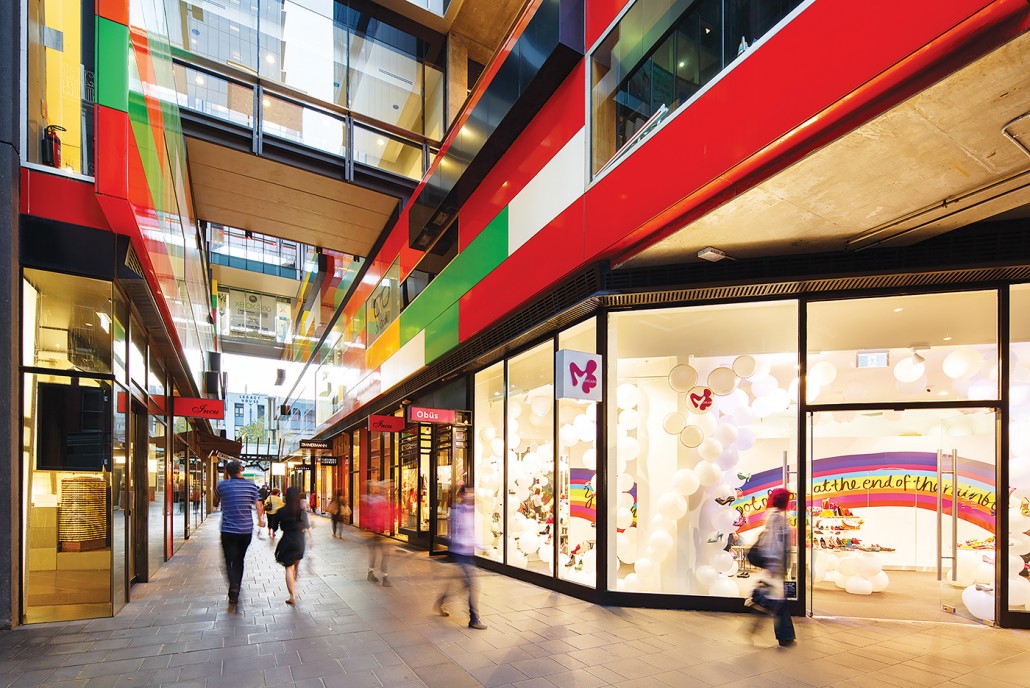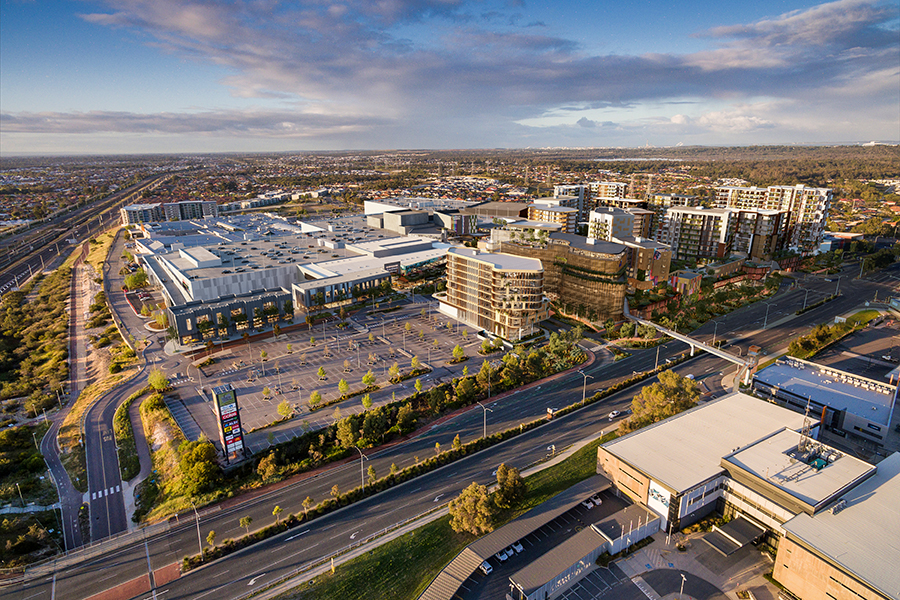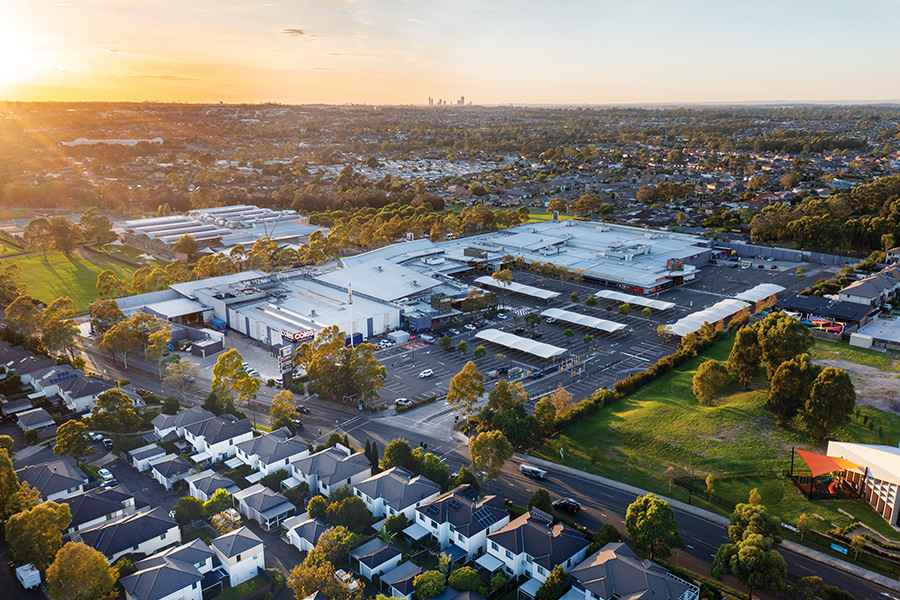City retail, especially that at the bases of prestige commercial office towers, is changing rapidly. Gone are the days when it was just simply about a few fast food shops, the odd chemist and, if you were lucky, a post office.
Today, CBD retail in commercial office blocks is sophisticated, classy and leading-edge with the accent on food & beverage. It’s not just fine food in casual dining formats, but it’s bars, restaurants, smart cafes, wine bars, often interspersed with fashion.
Dexus is leading the charge. As the number-one prestige office tower owner/manager in the country, Dexus understands the significant influence retail has on the commercial return of the offices above. Retail might well only be 5% of the revenue, but it’s 40% of the experience! The city retail team at Dexus is leading the way.
When it comes to CBD retail, it’s the big stuff that gets the attention. In Sydney, we look at Westfield Sydney; we might contrast it with Mid City Centre, or even the QVB. In Brisbane, we’d look at QueensPlaza and Wintergarden – all shopping centres in their own right, with some even making it to Big Guns status. There’s a plethora of retail in all CBDs that, in the main, gets little focus. It’s the stuff at the base of office towers, the odd strip here and there – in GLA terms, it’s mostly small pockets yet it’s sometimes significant. It’s ‘low profile’ stuff: agents usually lease the vacancies, and it’s not regarded as too important. The money comes from the tower above.
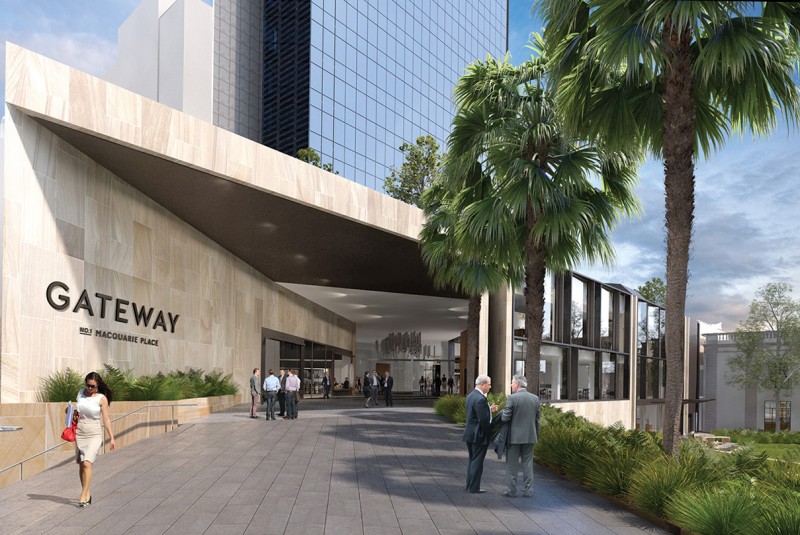
Not so with Dexus! But before we look at Dexus’s CBD holdings, it’s important to note that the company is a big retail player on any front – small stuff, huge stuff and anything in between! Its Scentre Group connections are solid with third party co-ownership of Westfield Miranda, Westfield Hurstville, Westfield Mt Druitt in Sydney, Westfield West Lakes in South Australia, Westfield North Lakes in Queensland, and Westfield Plenty Valley, Knox City Shopping Centre and Knox City Ozone in Victoria. This makes Dexus Property Group Scentre Group’s largest co-owner. On behalf of its third-party clients, Dexus manages Plumpton Marketplace, Tweed City Shopping Centre, Sturt Mall, Deepwater Plaza, Beenleigh Marketplace, Smithfield Shopping Centre, Willows Shopping Centre, and Shepparton Marketplace. It’s a retail portfolio with a value in excess of $4.1 billion. In addition, Dexus manages city retail including its own and partnership investments in Eagle Street Pier in Brisbane, and Southgate QV, and Galleria at 385 Bourke Street in Melbourne.
So why the focus on city retail? Again, you have to look further. Dexus is one of the largest office managers in Australia and, therefore, control numerous retail precincts at the base of towers. This retail has a significant influence on the success of the towers above.
I’m with Stewart Hutcheon, Head of Retail at Dexus. He’s a retail property man who’s done the rounds with stints at Westfield, Lendlease and Colonial where, based in Hong Kong, he ran the Chinese and South East Asian portfolio and saw city retail at its best.
He knows retail to the core; he’s lived it, eaten and breathed it. Retail-wise, in the development and management fields, he’s been everywhere, seen everything and done most things but where he sees a really exciting future is in CBD retail. “There’s so much potential here,” he says, “and much of it has been neglected for far too long.”
What’s interesting is the Dexus thinking on how the retail component in one of their commercial assets cannot be separated or viewed as a ‘different’ entity to the offices – the two are part and parcel of the whole. They feed off each other and it’s a classic example of where the whole is far greater than the sum of the individual parts.
“Retail may be 5–10% of the income, but it’s a lot more of the experience,” Hutcheon says, “and it goes further than that. The experience most definitely affects the commercial return, so you’ve really got to be sure that you get it right.” Hutcheon says Dexus has invested hard into city retail: “We haven’t just redeveloped the various precincts. We’ve invested heavily into people – experts in areas of city retail leasing, development, marketing and planning.
“We create environments that are better for the office workers and that increase our income. There’s less churn (of office tenants), because our tenants really do like the buildings more. There is no ‘fee leakage’ to agents; it’s all in-house and the team understands how the retail crosses borders and is inextricably linked to the success of the asset as a whole.”
Some three years ago, when he took over the role, Hutcheon launched a three-pronged strategy for the retail division, with one of these totally confined to city retail. The objectives are:
• To leverage the city retail portfolio scale to deliver retail end product to building occupants and visitors
• To be the joint venture investor/manager of choice in regional and super-regional centres (e.g. Scentre Group JV)
• To develop an all-encompassing, totally internal team to manage the 15-asset portfolio with niche capabilities within the 120 staff, ranging from management to leasing, retail planning, marketing, operations, development and finance, leveraging the IP from the JV where possible.
The ramification of getting the retail right in CBD assets extends to so many areas, says Hutcheon. “You get one chance to make a first impression and the retail is often the first impression!” he says. “It can be the first impression of a prospective lessee for a whole floor of offices – maybe several floors, and first impressions contribute enormously to final decisions.
“Look at the positioning of an office tower; you can have a prestigious structure, but neglect the retail and the tower loses its edge. The retail is the public face of the tower; it’s what the public see,” Hutcheon continues. “‘Image-conscious’ corporations require prestigious surroundings, and the retail sets the scene. It’s a fact that the retail at the base of a building has a direct influence on the rental value of the commercial space above.”
The importance of this city retail, plus the opportunities and the potential, are self evident when you look at Dexus’s latest development, Gateway at Sydney’s Circular Quay. Managed by Dexus, Gateway (and the name suits it as it is literally at the gateway to Sydney’s business hub) occupies a whole city block on Alfred Street between Loftus and Pitt Streets, bounded at the rear by Reiby Place. It sits in a magnificent position overlooking the two most famous, globally recognised Australian iconic landmarks, the Sydney Opera House and Sydney Harbour Bridge.
What do you put in a retail component below a major office tower? A food court, a bit of fashion with some services, a chemist perhaps? Old thinking. At Gateway, they’re taking the high ground.
It’s an $80-million project, converting the existing three-level retail podium into multiple dining precincts, more than doubling the retail space. To fully appreciate what they’re doing here and why, it’s necessary to understand the area and the numbers. The whole of Circular Quay and surrounds is in transition. AMP is redeveloping and the Wanda Group from China is a new player on the next block to Gateway. In the 45,300m2 Gateway tower itself, there are 3,000 office workers but that’s just where it begins. Trains, buses and ferries bring some 20,000 commuters to the area each day and the new light rail, just three years away, will bring 6,000 passengers to Circular Quay every hour. There are an estimated 35,000 residents in the catchment area and, to top all that off, the precinct has some 2.8 million visitors a year.
- $20-million upgrade of Grosvenor Place, Sydney
- $20-million upgrade of Grosvenor Place, Sydney
Dexus is going to redefine city food and beverage offerings. The entire three floors of the retail component will become a food and beverage emporium, showcasing the finest and widest range of tastes, pricepoints, atmospheres and settings.
On the ground floor it’s an open-style theme, exploiting the theatre of food preparation and maximising displays, all set in surrounds described as ‘a unique combination of bold geometric forms, luxurious stone and rich timber finishes’. It’s a level featuring cafés, bars and casual eateries’. Contemporary seating areas with textured and warm tones create a sense of opulence, yet they retain a relaxed and comfortable atmosphere.
This fast casual eatery and takeaway food level opens out to a massive outdoor dining area, fronting Circular Quay and spanning almost the entire block. Neil Perry’s ‘The Burger Project’ and Chat Thai were among the first operators to commit to the project, an indication of the quality of tenants leasing space at Gateway. Perry has described Gateway as ‘a landmark, iconic location’.
The second and third levels feature the more formal wining and dining experiences. The open-style concept is continued, creating a seamless transition from the existing lobby into dining spaces with a focus on natural materials, sophisticated tones and luxurious finishes.
The redevelopment of this three-level retail space isn’t limited to just the interior of the building. The existing Jessie Street Gardens along Loftus Street will be transformed, creating a peaceful, green public space with extensive seating providing a lush urban oasis for office workers, tourists and local residents to enjoy.
An organic sculpture in the voids between the three levels blurs the demarcation between indoors and out, with the inclusion of alfresco dining and connections to Jessie Street Gardens further enhancing the feature. There is a landscaped roof garden too, offering superb views of Sydney Harbour Bridge. Gateway is set to become the benchmark for F&B in the Sydney CBD.
The city retail arm of DEXUS stretches from Development to Retail Leasing across the Sydney CBD. Talking to the GM of Retail Leasing, Eddie Giraldo, City Retail Leasing Manager Pamela Medich and the rest of the city retail leasing team, you begin to understand the depth of knowledge, the expertise and the professionalism of this ‘city-focused’ retail outfit.
- Eddie Giraldo
- Pamela Medich
Dexus, Pamela tells us, owns or manages more than 20% of the city’s Prime-grade office towers and has, as tenants, some of the leading retailers on both the international and national scene. In a single block on Castlereagh Street, there is Tiffany & Co., Breitling, Georg Jensen, Lao Feng Xiang and the flagship Thomas Hardy store.
Just around the corner, in the repositioned 5 Martin Place – the old CBA ‘Money Box’ building – COS (Citizens of Style), H&M’s second largest brand, has opened its first Sydney outlet. 5 Martin Place also features the Australian flagship store of Kit and Ace, another brand of Canadian retailer Lululemon group. Also there is the German luxury luggage group, RIMOWA, and for a bit of local flavour, the latest venture from the team behind Reuben Hills and Paramount Coffee Project has opened its first city café. 5 Martin Place is very smart retail sitting in one of the most iconic and traditional structures in the country. The building comprises over 33,500m2 of premium-grade office space and close to 4,000m2 of retail over two levels.
- 5 Martin Place looking east
- 5 Martin Place, Sydney
At the other end of the block, a flagship opportunity is proposed on the corner of Pitt and King Streets, opposite Pitt Street Mall. Pamela Medich says, “There has been strong interest from international brands looking for the tightly held King Street location, which connects the luxury precinct of Castlereagh Street all the way to Louis Vuitton on George Street.”
There are some very interesting strategic alliances forming. For example, The Urban Purveyor Group has opened two new concepts with Dexus at Grosvenor Place. The first, Stella Ristorante & Terrazzo, design- and name-wise, draws inspiration from Harry Seidler’s classic architecture and Frank Stella’s abstract artworks which hang in the office lobby. The restaurant spans three levels and offers both indoor and alfresco seating. Sake Jr., a younger, more dynamic version of its older sibling, Sake Restaurant and Bar, caters to those pursuing a healthy lifestyle.
The Group were targeted by Dexus for the recent $20-million upgrade of Grosvenor Place. Sourdough Bakery Café and Bar opened a boutique dessert bar and patisserie, joining Grand Duk which offers a French/American style lunch and a Vietnamese dinner menu. It was a total revamp of the precinct involving five new major tenants. Spanning four levels and featuring an amazing indoor/outdoor terrace, it’s given another dimension to the iconic building at its base and has become a sought-after destination for the city worker looking for a sophisticated food and beverage offer.
Australia Square, another iconic Sydney landmark, is presently undergoing a complete retail makeover. Around half of the tenants will change, there will be totally new fit-outs and all common areas will be revamped.
- Eagle Street Pier – a superior entertainment and lifestyle precinct, Brisbane
- Australia Square, a Sydney icon
-  Prime casual dining at Southgate Melbourne
At Australia Square, the Ryan family occupy the popular alfresco bar, Ryans Bar. The family is leading the way in converting difficult upper-level spaces into rooftop conversions. Patrick Ryan says, “We are extremely proud of the success of Taylors at The Republic and have approached DEXUS to turn the Paragon at Gateway into a rooftop bar, to provide a new-to-market concept which complements the food being introduced as part of the Gateway development.”
It’s all very smart stuff, and it’s changing the face and the style of retail in the Sydney CBD. To the general public and the CBD worker, it might appear that there’s just an ‘across the board’ retail uplift occurring in some pockets scattered about the city but, when you look at the extent of DEXUS’s commitment, you realise that this city retail team is significantly influencing the standards being set right across the city. They are the prime movers.
Hutcheon says that their focus on the city has given them great insights into the demands not just of the city dwellers, workers and visitors, but also the restaurateurs, the retailers, the food and beverage organisations and the whole of the entertainment and leisure sector. “Those operating in the CBD have different requirements – they think differently and operate in a different dimension,” says Hutcheon. “Their operations are faster, more sophisticated, slicker and more voluminous than their suburban counterparts.
Their market is different too; it’s stylish, international, well travelled, affluent and very demanding. If you’re going to deal with the best of these operators then you have to be able to talk concepts, to transmit vision, to express ideas,” he continues. “We learn from them; we hear about new ventures, what’s coming in and what’s considered as passé. We often change direction, tweak the retail plan, embrace a new idea as it presents itself. There’s a need for a flexible approach. We need to leverage our knowledge of this sector and bring the best to all our projects.”
But it’s not all plain sailing; other factors come into play when dealing with authorities. “The rules can be totally different for two properties just a couple of blocks apart,” says Hutcheon. “We put a lot of effort into working with all stakeholders to get outcomes – sometimes this means councils, heritage authorities, tenants, and even developers need to compromise!”
Hutcheon and the team are passionate on the topic, which they deal with on a daily basis. “Of course we all want the best for the city,” says Hutcheon. “No one is in favour of no regulation, but we all want a vibrant, active city.”
New concepts are emerging all the time, such as a new type of restaurant or bar that might have started in London, New York or even Shanghai and then spread across the globe. “It could be in most major cities and Sydney has to make sure it does not miss the wave,” says Hutcheon.
“We broke out of that mindset decades ago. Australia used to be a bit backward, lagging behind when it came to new international trends. But then we changed dramatically – we didn’t only catch up but we started to lead. Sydney emerged as a great city, a trendsetter, and we want to stay out in front.”
Dexus isn’t just changing the CBD face of Sydney but, as one of the largest commercial office managers in Australia, it’s active in many other major cities. The strategic alliances with major retailers stretch interstate, and give Dexus leading-edge status when redeveloping its retail portfolio.
The recently acquired Eagle Street Pier in Brisbane, as part of the Waterfront Place Complex, is generally acknowledged as the superior entertainment and lifestyle precinct in the city, with operations like Sake Restaurant and Bar, Aria (from Sydney), Pony, Cha Cha Cha, and Il Centro all part of the waterfront precinct. “Eagle Street is a great example of how we will leverage our CBD knowledge,” says Eddie Giraldo, Dexus’s GM, Retail Leasing. “We draw from our experiences in Sydney and Melbourne. When we talk to people like Aria, and Urban Purveyor Group, they know we have the skills to deliver. It’s great to have the vision but, if you haven’t got the skills and the ability to deliver, then you’ve got nothing!”
Sticking with the water’s edge but moving a long way south, the Dexus ‘renaissance’ of Southgate overlooking the Yarra River in Melbourne is testimony to those skills and the ability to deliver. Hutcheon says, “It was a high-risk venture – you’ve got to back chefs and new concepts. It’s a huge ask but, when you pull it off, everyone benefits and the city gets another landmark precinct. This is not just about leasing space; it’s about forming relationships with people – individuals and personalities who are at the pointy end of the entertainment and leisure business. It’s about understanding them and joining forces to give them an avenue for their self-expression.”
Waterslide Bar at Southgate opened last year and is already a great hit. Waterslide’s Venue Manager Tim Wastell joined forces with Black Pearl’s Fred Siggins to create a stunning new cocktail bar. Tim was Australian Bar Manager of the Year in 2009, having plied his craft at some of Melbourne’s ‘institutions’ like The Blue Diamond and The Saint at St Kilda. He also worked for a year at Rockpool Bar and Grill in Perth.
Southgate is the prime casual dining precinct of the region. Last year saw the Scottish Michelin-starred chef David Hall move into Pure South Dining, while Japanese master chef Yosuke Furukawa took hold of the reigns at Miyako.
Young Chef of the Year for 2013, Mark Briggs, back from honing his skills at three Michelin-starred restaurants in the UK, has joined the team at Waterfront restaurant at Southgate.
The redevelopment now features some of the finest operations in the city. “What happens when you get it right,” says Eddie Giraldo, “is that the word gets out in the industry. These chefs, the innovators, the movers and shakers, the entrepreneurs in this business tend to move in a pack; they seek out locations where they can congregate, where they can create a precinct – they know there’s opportunity in variety and choice. We’re in tune with that at Dexus.”
Back in the heart of the city of Melbourne, a renovation completed just three months ago is the QV Urban Market. It’s just opposite Melbourne Central and is another Dexus-managed building, comprised of offices with retail at the base – it’s a $780-million asset. “It was tired,” says Jeremy Fredersdorff, Dexus’s Regional Leasing Manager in Melbourne, “and a bit outdated. Our brief was simple: ‘to reposition it as a unique, complete and leading food offer in the Melbourne CBD’. It’s now finished and the MAT has significantly increased; retailers and the public love it.”
The laneways leading into the centre, and those which are part of it, have been revamped and the mix is somewhat eclectic and very Melbourne. The French Fashion house A.P.C. has a store in the laneway, there’s Max Brenner, and Flower Temple, a really chic florist, adds uniqueness to the mix. Red Spice has an impressive selection of small bites and Meat Fish Wine on Artemis Lane is described by a local blogger as simply ‘a gorgeous wine bar and kitchen’.
Move into the centre proper and you’ll find a Woolworths and Big W – MAT-wise, it’s one of the best in the state of Victoria. In all, there are 110 shops, so it’s quite a sizable city holding – basically a subregional shopping centre in the heart of the CBD.
- QV Urban Market, Melbourne
- QV Urban Market, Melbourne
- QV Urban Market, Melbourne
- QV Urban Market, Melbourne
What’s very different when you talk to Dexus about city retail is their approach, regarding it as very different to other forms of retail. The market is different; this is not family retail or ‘weekly shopping’ stuff. In the centre, the CBD of any capital city, the market is more affluent. At lunchtime it wants a range of food from takeaway to fine dining, but it needs to be the best, the latest, the most innovative. At the base of prestige commercial buildings, the fashion needs to be chic, international, leading edge. At night the bars come into their own and the restaurants often adopt a different style.
City residents eat out much more than their suburban counterparts, and their requirements are different. City workers and dwellers (often with the same people filling both fields) expect change; they are used to experiencing new things and are constantly on the lookout for the latest trends. City retail can’t stand still, and it’s not enough to just tweak it every few years. Retail ‘dates’ very quickly in the CBDs of major cities, and the constant search for the new is part of the very fabric – a basic characteristic – of the city market. Take your eye off the ball for a little while and you’ll lose out. When your product is a prestigious commercial office tower, there’s a lot to lose; the city doesn’t take prisoners!
Keeping abreast of what’s new and what’s emerging is an integral part of the Dexus strategy.
The city retail team is constantly in touch with the movers and shakers in the entertainment and leisure sectors; it’s part and parcel of managing a CBD property. To sum it all up, one just has to look at why some people don’t like the city. “It’s too fast,” they say; “it’s too crowded and the pace is frenetic. Everyone’s moving so rapidly and they’re all trying to outdo each other. It’s too competitive – you don’t know where you are half the time, and there’s no respite!”
That’s exactly what the city retail team at Dexus like! SCN


